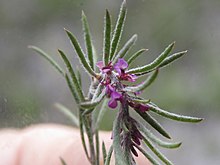Muraltia bolusii
Muraltia bolusii is a plant species in the milkwort family (Polygalaceae). It is endemic to sandy coastal flatland with altitudes below 500 metres (1,600 ft) in Western Cape, South Africa.[1][2][3] It was first described in 1954 by Margaret Levyns in the Journal of South African Botany.[4] The Red List of South African Plants has listed it as endangered since 2007 due to habitat loss caused by nearby urban expansion, crop cultivation, and sand mining, as well as invasive species. Its population is decreasing.[2]
| Muraltia bolusii | |
|---|---|
 | |
Endangered (Red List of South African Plants) | |
| Scientific classification | |
| Kingdom: | Plantae |
| Clade: | Tracheophytes |
| Clade: | Angiosperms |
| Clade: | Eudicots |
| Clade: | Rosids |
| Order: | Fabales |
| Family: | Polygalaceae |
| Genus: | Muraltia |
| Species: | M. bolusii |
| Binomial name | |
| Muraltia bolusii | |
Description
It is a perennial erect or spreading shrublet with a height up to 20 centimetres (7.9 in).[1][3] It branches mainly from its base. Its leaves are stalkless and mostly bundled with a pointed tip. Its flowers are pink, stalkless, and 3.3 to 4 millimetres (0.13 to 0.16 in) long. It flowers between September and January.[1]
References
- Hermanus Botanical Society. "Muraltia bolusii". Fernkloof Nature Reserve. Retrieved July 5, 2020.
- South African National Biodiversity Institute. "Muraltia bolusii Levyns". Red List of South African Plants. Retrieved July 5, 2020.
- "Muraltia bolusii Levyns". www.ville-ge.ch. Conservatoire et Jardin botaniques Ville de Geneve. Retrieved July 5, 2020.
- Harvard University; Royal Botanic Gardens Kew; Australian National Herbarium. "Muraltia bolusii". International Plant Names Index. Retrieved July 5, 2020.